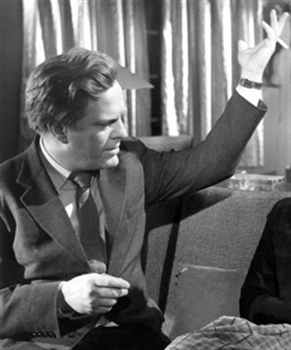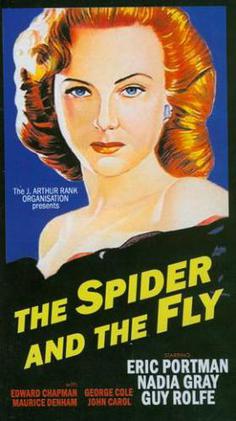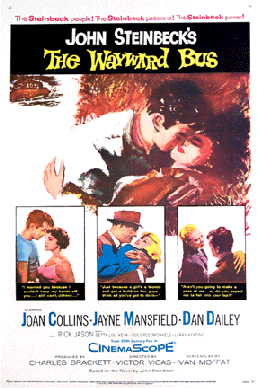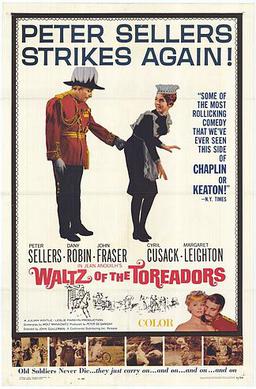Related Research Articles

E. Maurice "Buddy" Adler was an American film producer and production head for 20th Century Fox studios.

Sam Katzman was an American film producer and director. Katzman's specialty was producing low-budget genre films, including serials, which had disproportionately high returns for the studios and his financial backers.

Carl Foreman, CBE was an American screenwriter and film producer who wrote the award-winning films The Bridge on the River Kwai and High Noon, among others. He was one of the screenwriters who were blacklisted in Hollywood in the 1950s because of their suspected communist sympathy or membership in the Communist Party.

Seth Holt was a Palestinian-born British film director, producer and editor. His films are characterized by their tense atmosphere and suspense, as well as their striking visual style. In the 1960s, Movie magazine championed Holt as one of the finest talents working in the British film industry, although his output was notably sparse.

Screen Gems is an American film production company owned by Sony Pictures Entertainment, a subsidiary of Japanese multinational conglomerate, Sony Group Corporation. The Screen Gems brand has served several different purposes for its parent companies over the decades since its incorporation, initially as a cartoon studio, then a television studio, and later on as a film studio. The label currently serves as a film production that specializes in genre films, mainly horror.

Eric Harold Portman was an English stage and film actor. He is probably best remembered for his roles in three films for Michael Powell and Emeric Pressburger during the 1940s.

The Spider and the Fly is a 1949 British crime film directed by Robert Hamer and starring Eric Portman, Guy Rolfe and Nadia Gray. The screenplay concerns an unusual love triangle that develops between two criminals and a policeman on the eve of the First World War. Hamer made it immediately after Kind Hearts and Coronets.
Kenneth Graham Hughes was an English film director and screenwriter. He worked on over 30 feature films between 1952 and 1981, including the 1968 musical fantasy film Chitty Chitty Bang Bang, based on the Ian Fleming novel of the same name. His other notable works included The Trials of Oscar Wilde (1960), Of Human Bondage (1964), Casino Royale (1967), and Cromwell (1970). He was an Emmy Award winner and a three-time BAFTA Award nominee.

I Was Monty's Double is a 1958 film produced by the Associated British Picture Corporation and directed by John Guillermin. The screenplay was adapted by Bryan Forbes from the autobiography of M. E. Clifton James, an actor who pretended to be General Bernard Montgomery as a decoy during World War II.

Robert Lenard Lippert was an American film producer and cinema chain owner. He was president and chief operating officer of Lippert Theatres, Affiliated Theatres and Transcontinental Theatres, all based in San Francisco, and at his height, he owned a chain of 139 movie theaters.

The Wayward Bus is a 1957 American drama film directed by Victor Vicas and starring Joan Collins, Jayne Mansfield, Dan Dailey and Rick Jason. Released by 20th Century-Fox, the film was based on the 1947 novel of the same name by John Steinbeck.
Warwick Films was a film company founded by film producers Irving Allen and Albert R. Broccoli in London in 1951. The name was taken from the Warwick Hotel in New York City where Broccoli and his wife were staying at the time of the final negotiations for the company's creation. Their films were released by Columbia Pictures.

Town on Trial is a 1957 British mystery film directed by John Guillermin and starring John Mills, Charles Coburn, Barbara Bates and Derek Farr. A whole town comes under suspicion when two grisly murders are carried out—particularly members of the local sports club.

Adelphi Films Limited was a British film production company. With its sister company Advance, it produced over 30 films in the 1940s and 1950s and distributed many more. Adelphi linked Gainsborough Pictures and the raw “kitchen sink” dramas of the early 1960s.

The Long Haul is a 1957 British drama film directed and written by Ken Hughes and starring Victor Mature, Diana Dors and Patrick Allen. It is based on the novel The Long Haul by Mervyn Mills.

John Guillermin was a French-British film director, writer and producer who was most active in big-budget, action-adventure films throughout his lengthy career.

Waltz of the Toreadors is a 1962 film directed by John Guillermin and starring Peter Sellers and Dany Robin. It was based on the play of the same name by Jean Anouilh with the location changed from France to England. It was nominated for a BAFTA Award for Best British Screenplay, in 1963.
Aubrey Baring (1912–1985) was a British film producer. For a number of years he was in partnership with Maxwell Setton. They made movies for a newly organised Mayflower Productions, releasing through Rank.
Mayflower Productions was a British-based film production company of the 1930s and 1950s.
Tony Owen was an American agent and producer, who was married to Donna Reed.
References
- ↑ McFarlane, Brian (28 February 2014). The Encyclopedia of British Film: Fourth edition. Oxford University Press. pp. 688-689; ISBN 9781526111968
- ↑ "Maxwell Setton: Interview notes". The History Project . Retrieved 4 June 2021.
- ↑ "British Company At Work Again". Weekly Times . No. 4180. Victoria, Australia. 3 August 1949. p. 48. Retrieved 20 August 2017– via National Library of Australia.
- ↑ Schallert, E. (1956, May 26). "Drama" Los Angeles Times
- ↑ A.H. WEILER. (1957, Dec 22). "BY WAY OF REPORT" New York Times. Accessed 4 October 2022.
- ↑ Vagg, Stephen (17 November 2020). "John Guillermin: Action Man". Filmink.
- ↑ Harper, Sue; Porter, Vincent (2003). British Cinema of the 1950s: The Decline of Deference. Oxford University Press. pp. 178–180. ISBN 9780198159346.
- ↑ "Columbia pictures elects" (1965, Nov 08). New York Times
- ↑ By, A. H. W. (1969, July 15). [ "Roth's 'letting go' heads for filming"] New York Times
- ↑ Martin, B. (1969, Oct 31). "Stars announced for roles in 'El condor'" Los Angeles Times
- ↑ "Italian honor presented to bluhdor" (1971, Jul 10). Los Angeles Times
- ↑ By A.H. WEILER. (1970, Jan 02). "'69 a bad year for good films, Catholic movie office finds" New York Times